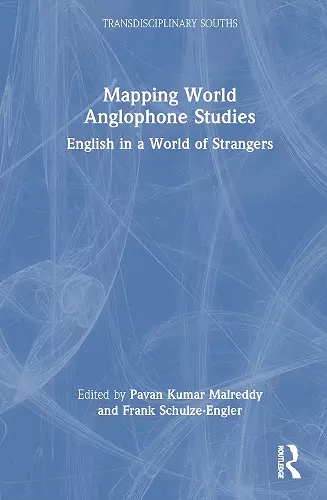Mapping World Anglophone Studies
English in a World of Strangers
Pavan Kumar Malreddy editor Frank Schulze-Engler editor
Format:Paperback
Publisher:Taylor & Francis Ltd
Published:30th Oct '24
Currently unavailable, and unfortunately no date known when it will be back

This book explores core issues in the emerging field of World Anglophone Studies. It shows that traditional frameworks based on the colonial and imperial legacies of English need to be revised and extended to understand the complex adaptations, iterations, and incarnations of English in the contemporary world.
The chapters in this volume make three significant interventions in the field:
- First, they showcase the emergence of Anglophone literatures and cultures in parts of the world not traditionally considered Anglophone – Cuba, the Arab world, the Balkan region, Vietnam, Algeria, and Belize, among others
- Second, they feature new zones of contact and creolization between Anglophone literatures, cultures, and languages such as Swahili, Santhali, Ojibway, and Hindi, as well as Anglophone representations of colonial encounters and contemporary experiences in non-Anglophone settings such as Cuba, Angola, and Algeria
- And finally, the volume turns to Anglophone literary and cultural productions on new platforms such as social media and Netflix and highlights the role of English in emergent sites of resistance involving women, Indigenous populations, queer and other non-heteronormative sexualities, as well as post-conflict societies
Mapping linguistic transgressions and the transmigration of cultural tropes between Englishes, vernaculars, and a wide variety of other languages with a rich set of case studies, this volume will be essential reading for courses such as world literatures in English, postcolonial studies, anglophone studies, literature and culture, Indian Ocean worlds, Global Englishes, and Global South studies.
“Mapping World Anglophone Studies: English in a World of Strangers is a rich and formidable contribution to scholarly research and debates in World Anglophone Studies. Emerging at the crossroads of contemporary postcolonial and world literary studies, “World Anglophone” is a salutary correction to the term “Global Anglophone,” with its limiting connotation of globalisation and its correlate commodities. The critical approach Malreddy and Schulze-Engler have adopted is immersive in relation to the lived realities and language worlds in erstwhile colonies and protectorates, within which Anglophone literature operates as a dominant minority. The scope of this collaborative volume is breathtakingly ambitious, with active forays into the local and “vernacular” languages and literatures which have historically informed the emergence of Anglophone literature and continue to inflect it. The volume’s outreach is matched with careful examinations of the specificities of and marked variations in Anglophone literature in each region under consideration. It adds new dimensions to World Anglophone Studies by not just recording the spread and sway of the World Anglophone but reenergising terms of exegesis such as the transnational and translingual, indigenous, and creole.” - Ankhi Mukherjee, University of Oxford
“This timely, diverse, and imaginative volume of essays sets the agenda for the rapidly emerging field of World Anglophone Studies. In engaging critically with English as it moves and morphs amidst proliferating circuits of cultures, peoples, and places – shaping a new cosmopolitics of ‘strangers’ – the contributors spotlight the myriad ways in which today’s Anglosphere is characterised and complexified by conflict, combat, and contestation. Suspicious of both Anglophilia and Anglophobia, Mapping World Anglophone Studies reaches past well-worn notions of ‘writing back’ while refusing to reject English when committing to decolonising the mind. Instead, in tracking the polycentric networks where English is repeatedly transformed by the vernacularising agency of millions worldwide, time and again these essays unlock an expanding archive of impactful Anglophone endeavours that stubbornly contend with reterritorializing authorities and their oft-favoured nativist or nationalist imaginaries. Here English’s global flow is newly prized not only in more familiar locations – Australia, Kenya, India, Trinidad – but also across the Anglosphere’s novel domains: Algeria, Cuba, the Balkans. Ultimately, in gauging the global reach of the Anglosphere, its critique of as well as complicity in the world system, Mapping World Anglophone Studies entirely recalibrates how we might revalue English as newly minted critical world language.” - John McLeod, University of Leeds, UK
“For one who has been struck by the promiscuous, liminal, multi-platforming, transboundary, magnetising, mercurial, and adaptable character of certain languages (as well as their intent and capacity to survive, thrive and spread themselves like a useful weed), this book is a gift. A work that sets out to “map the linguistic transgressions and the transmigration of cultural tropes between Englishes, vernaculars, and beyond” and which intends to “capture the complex adaptations, iterations, and incarnations of English in the contemporary world” is long overdue. English has transformed itself into a language rooted in many places of the earth, a lingua franca for our allusive multipolarity. It is a companion for the many rather than the one, propelled to this probably because it became the language of the seas, the air, of trade and exchange, a character trait that had once made Kiswahili a lingua franca of particular sea worlds before English installed itself with sound and fury. The book is also a testament to how a language domesticated itself to survive and thrive. You will find traces of this phenomenon in this book of rich texts, a brief yet thrilling cartography of English(es) in the world.” - Yvonne Adhiambo Owuor, Kenya
ISBN: 9781032886633
Dimensions: unknown
Weight: 540g
264 pages